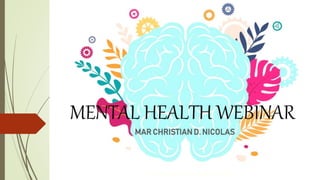awareness to--MENTAL HEALTH WEBINAR.pptx
- 1. MENTAL HEALTH WEBINAR MAR CHRISTIAN D. NICOLAS
- 2. What Is Mental Health? Mental health includes our emotional, psychological, and social well-being. It affects how we think, feel, and act. It also helps determine how we handle stress, relate to others, and make choices. Mental health is important at every stage of life, from childhood and adolescence through adulthood.
- 3. What Is Mental Health? Adolescence is a crucial period for developing and maintaining social and emotional habits important for mental well-being. These include adopting healthy sleep patterns; taking regular exercise; developing coping, problem-solving, and interpersonal skills; and learning to manage emotions. Supportive environments in the family, at school and in the wider community are also important. An estimated 10-20% of adolescents globally experience mental health conditions, yet these remain underdiagnosed and undertreated.
- 4. Factors that can contribute to stress during adolescence include: Desire for greater autonomy, Pressure to conform with peers, Exploration of sexual identity, and Increased access to and use of technology
- 5. Mental health determinants Emotional disorders commonly emerge during adolescence. In addition to depression or anxiety, adolescents with emotional disorders can also experience excessive irritability, frustration or anger. Symptoms can overlap across more than one emotional disorder with rapid and unexpected changes in mood and emotional outbursts. Younger adolescents may additionally develop emotion-related physical symptoms such as stomach ache, headache or nausea.
- 6. Mental health determinants Eating disorders commonly emerge during adolescence and young adulthood. Eating disorders affect females more commonly than males. Conditions such as anorexia nervosa, bulimia nervosa and binge eating disorder are characterized by harmful eating behaviors such as restricting calories or binge eating. Eating disorders are detrimental to health and often co-exist with depression, anxiety and/or substance misuse.
- 7. Mental health determinants Suicide and self-harm - An estimated 62 000 adolescents died in 2016 as a result of self-harm. Suicide is the third leading cause of death in older adolescents (15-19 years). Nearly 90% of the world’s adolescents live in low-or middle-income countries and more than 90% of adolescent suicides are among adolescents living in those countries. Risk factors for suicide are multifaceted, including harmful use of alcohol, abuse in childhood, stigma against help- seeking, barriers to accessing care and access to means. Communication through digital media about suicidal behavior is an emerging concern for this age group.
- 9. What Causes Stress? examinations deadlines returning to study pressure of combining paid work and study difficulty in organizing work poor time management leaving assignments to the last minute out of control debts
- 10. What Causes Stress? poor housing overcrowding noise adjusting to life in a new environment or even country difficulties with personal relationships (e.g. splitting up) balancing the demands of a family with studying parents or problems at home
- 11. How Too Much Stress Affects Us? Physically Mentally Emotionally
- 12. Healthy Ways to Cope with Stress Take breaks from watching, reading, or listening to news stories, including those on social media. It’s good to be informed but hearing about the traumatic event constantly can be upsetting. Consider limiting news to just a couple of times a day and disconnecting from phone, TV, and computer screens for a while. Take care of yourself. Eat healthy, exercise, get plenty of sleep, and give yourself a break if you feel stressed out. Take care of your body.
- 13. Healthy Ways to Cope with Stress Take deep breaths, stretch, or meditate external icon. Try to eat healthy, well-balanced meals. Exercise regularly. Get plenty of sleep. Avoid excessive alcohol, tobacco, and substance use. Make time to unwind. Try to do some other activities you enjoy.
- 14. Healthy Ways to Cope with Stress Talk to others. Share your problems and how you are feeling and coping with a parent, friend, counselor, doctor, or pastor. Connect with others. Talk with people external icon you trust about your concerns and how you are feeling. Recognize when you need more help. If problems continue or you are thinking about suicide, talk to a psychologist, social worker, or professional counselor.
Editor's Notes
- Desire for greater autonomy, (everyone else; why can’t I?)
- Desire for greater autonomy, (everyone else; why can’t I?)
- Desire for greater autonomy, (everyone else; why can’t I?)
- Desire for greater autonomy, (everyone else; why can’t I?)
